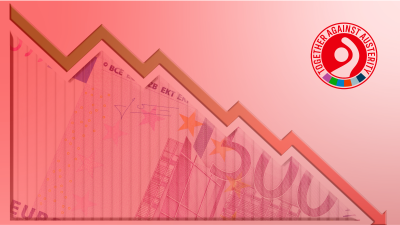The alarming contraction in economic activity in the Eurozone shows why the European Central Bank (ECB) needs to lower interest rates further and faster.
The eurozone is facing its first economic contraction in seven months, with the composite Purchasing Managers' Index (PMI) published this week falling below the critical threshold of 50.
The development signals shrinking activity in both manufacturing and services sectors and highlights the fragility of the economic situation, particularly in Germany and France.
No to austerity – Yes to sustainable jobs
Lowering interest rates rapidly will not only ease the financial burden on businesses and households, but also create the necessary conditions for investments in sustainable, quality jobs, particularly in sectors supporting the green transition.
The European Trade Union Confederation (ETUC) calls on the ECB to expand its focus beyond inflation and include job creation and the transition to a green economy as part of its mandate.
In light of the revision of the EU's economic governance framework, the ETUC also urges Member States to avoid applying damaging austerity measures that could further jeopardize jobs and weaken the recovery.
Responding to the development, ETUC Confederal Secretary Ludovic Voet said:
"This is a wake-up call for the ECB and member states. Workers are already feeling the strain, and a further tightening of monetary or fiscal policy would risk pushing millions into unemployment.”
“As economic activity contracts and business confidence reaches its lowest level in nearly a year, it is clear that austerity is not the answer. Any return to austerity would only exacerbate the slowdown, threaten job security, and hinder much-needed investments in public services, social protection, and climate action.
"We are urging governments across Europe not to repeat the mistakes of the past. Austerity measures, as seen during previous crises, have devastating impacts on workers and families, causing widespread job losses and deepening inequalities. This time, Member States must act to protect jobs, support workers, and ensure that fiscal policies are aligned with long-term objectives, such as decarbonation and quality jobs.
"The ECB can and must enlarge its mandate to support full and quality employment, while fighting climate change in addition to maintaining price stability."

